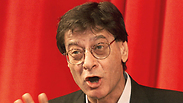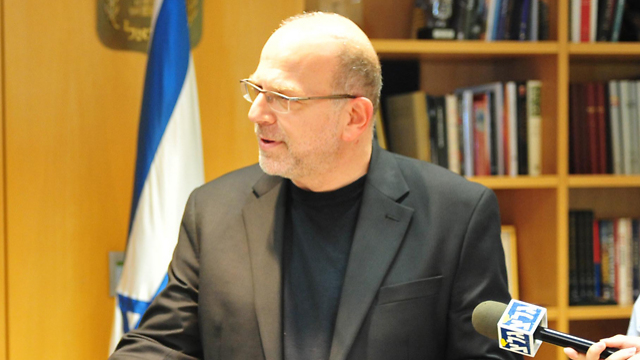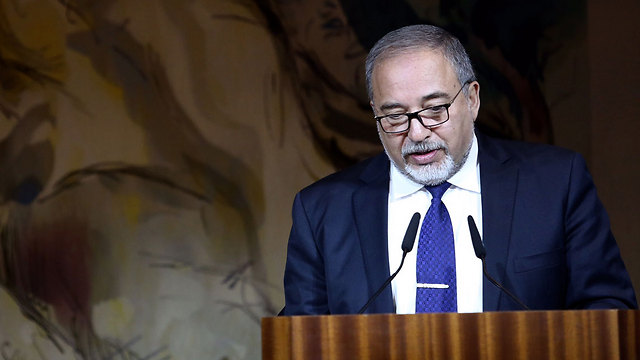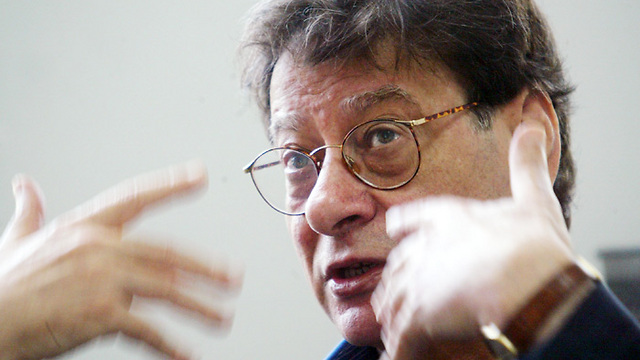
Lieberman to Army Radio commander: Palestinian poet can't be part of Israeli narrative
The minister of defense met with the head of Army Radio following a braodcast in which the controversial poet Mahmouf Darwish was a topic of discussion; Lieberman compared a discussion of Mahmoud Darwish's work, which deals exclusively with the Palestinian narrative, to a discussion of the literary qualities of Mein Kampf.
Lieberman lamented the fact that "someone who writes texts against Zionism, which are used to this very day as fuel for terror attacks against Israel, gets the honor of his creations being included by the station as part of texts that made it into Israel canon, alongside 'Jerusalem of Gold' and 'The Silver Platter.'"
During their meeting, the defense minister told Dekel that "Mahmoud Darwish, who called in his poems for the (expulsion) of the Jewish people from the land of Israel … cannot be a part of the foundational narrative of (Israeli society) as was displayed in the program broadcast on Army Radio."

According to a statement from his office, Lieberman told Dekel that the same logic used by the Army Radio editors to approve Darwish's work for discussion could be applied to add the legacy of Mufti Haj Amin al-Husseini to the Israeli narrative, or to discuss the literary merits of Adolf Hitler's book Mein Kampf on the air.
Lieberman further said to Dekel that the government was not going to interfere with Army Radio's content, but that the point of having a military radio station in a democratic and complex society like Israel is to strengthen solidarity and not to deepen divides. Lieberman went on to say that there is a difference between freedom of speech and incitement, and that Dekel should emphasize that to the Army Radio staff.
Dekel said during the meeting that he places importance on the protection of free speech, arguing that studying a text does not equate to agreeing with it. He added, however, that framing these texts as part of an Israeli narrative may be misconstrued.
During the show, broadcast on Monday night, host Kobi Meidan was discussing one of the Palestinian poet's more famous poems, "Identity Card," written in 1964. In the poem, Darwish describes the thoughts and feelings of an Arab standing at the checkpoint in front of a soldier.
Among the verses of poem are the lines:
"Write down!
I am an Arab
And my identity card number is fifty thousand
I have eight children
And the ninth will come after a summer
Will you be angry?"
"I do not hate people
Nor do I encroach
But if I become hungry
The usurper's flesh will be my food
Beware..
Beware..
Of my hunger
And my anger!"
Darwis was born in 1941 in a village in the western Galilee and then moved to Haifa. He later left the country and passed away in 2008 in Houston. He's buried in Ramallah. He is considered by many to be the Palestinians' national poet.
Atyaeb Ranieb, an Arab journalist hosted on the show, explained that the poem "is an angry one, with a tone of rage towards the occupier, the enemy, the settler and the invader."
Ranieb described the "destruction left by the occupation in urban centers like Haifa and Jaffa. At the time, (Arab) society was in shock, in post-trauma, and the option offered by Darwish was of a voice that wants to fight against the occupation."
Despite a variety of political content featured on Army Radio over the years, Israel's defense ministers, including Lieberman's two most recent predecessors Moshe Ya'alon and Ehud Barak, mostly avoided interfering with the station's broadcasts.
Meanwhile, Attorney General Avichai Mandelblit has informed Minister Lieberman that he cannot directly interfere with Army Radio's content.












